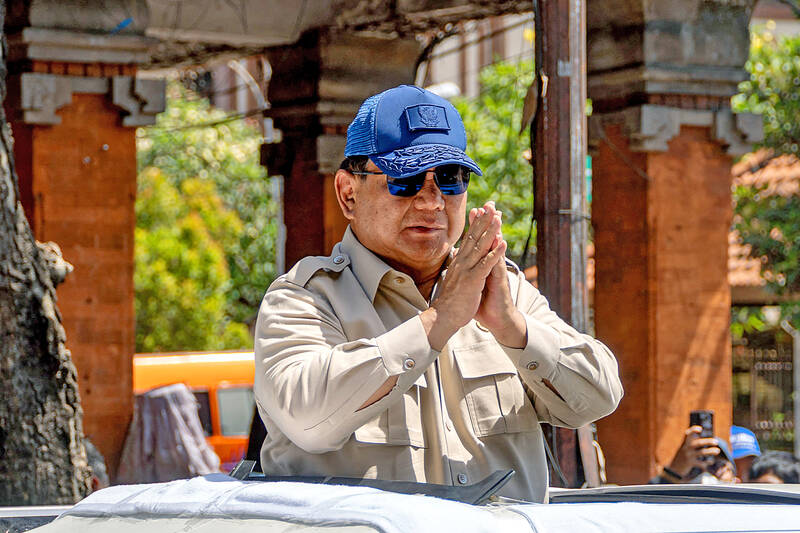In removing Indonesia’s finance minister and U-turning on protester demands, the leader of Southeast Asia’s biggest economy is scrambling to restore public trust while seizing a chance to install loyalists after deadly riots last month, experts say.
Demonstrations that were sparked by low wages, unemployment and anger over lawmakers’ lavish perks grew after footage spread of a paramilitary police vehicle running over a delivery motorcycle driver.
The ensuing riots, which rights groups say left at least 10 dead and hundreds detained, were the biggest of Indonesian President Prabowo Subianto’s term, and the ex-general is now calling on the public to restore their confidence in his government.

Photo: AFP
He vowed tough action on the officers who ran over 21-year-old Affan Kurniawan, backtracked on lawmaker housing allowances, and on Monday removed five ministers, including respected finance minister Sri Mulyani Indrawati.
“We can read this as damage control after the wave of public anger, especially at... the misdirected budget efficiency,” said Rani Septyarini, a researcher at the Center of Economic and Law Studies.
Prabowo has focused on expensive social mega-projects funded by widespread budget cuts that already roused protests in February. His flagship policies include a free meal program and a new sovereign wealth fund.
New Indonesian Minister of Finance Purbaya Yudhi Sadewa on Wednesday said he would inject an unprecedented US$12 billion into the economy to spur growth and calm simmering public anger.
“Prabowo sees this problem as something that needs to be anticipated seriously,” said Airlangga Pribadi Kusman, political analyst at Airlangga University. “He wants to prevent further social damage.”
Prabowo surged to victory in last year’s election and maintained a high approval rating of more than 80 percent 100 days after entering office in October last year, according to polls.
However, the protests turned increasingly angry against the country’s political elite, with mobs burning buildings and looting politicians’ homes.
“This shows that the public has a real, legitimate problem with this administration,” Airlangga said.
Yet the Indonesian leader has used the reshuffle to replace officials linked to popular former Indonesian president Joko Widodo, more commonly known as Jokowi, with his own people.
Sri Mulyani served for eight years under Jokowi, while Purbaya is close to key government economic adviser Luhut Binsar Pandjaitan — an ex-military colleague of Prabowo.
“Prabowo is using the moment to slowly consolidate his political power by erasing Jokowi’s influence,” said Virdika Rizky Utama, a political researcher at think tank PARA Syndicate.
Indonesian State Secretary Prasetyo Hadi on Monday last week said the replacements were the right people for the job.
The presidential palace did not respond to an AFP comment request.
To win back public trust, experts say Prabowo — former son-in-law of late dictator Suharto — needs to address an expanding wealth gap and weakening democracy in a nation long known for dynastic politics which only emerged from autocracy in the 1990s.
“What we need is the determination from the president, a political will, and real progress,” Airlangga said.
In installing loyalists to oversee budget and security, Prabowo appears to be trying to uphold his flagship programs, rather than change course.
“Putting trust in people who are well-known becomes key to securing [his] policies,” said Wasisto Raharjo Jati, political analyst at the National Research and Innovation Agency, adding that those hired were from Prabowo’s “closest circles.”
“Prabowo will be more comfortable moving forward if his flagship programmes are handled by trusted figures,” he added.
It is still unclear if Prabowo’s new hires are up to the job of making life better for Indonesians.
While Sri Mulyani had stints at the World Bank and IMF, Purbaya is a relatively unknown finance professional who immediately lauded Prabowo’s ambitious growth goal of eight percent annually as achievable.
“Their competence, experience, and technological skills must still be demonstrated,” Wasisto said.
Some say Prabowo should change course on his social projects as the country grapples with stagnant wages and rising unemployment.
“If the corrections are half-hearted... the perception of justice will worsen, and the social pressure will continue,” Rani said.
The conciliatory moves and a call for calm appear to have bought Prabowo time, but without addressing the root of the public’s anger, analysts say another inflammatory incident could ignite bigger protests.
“This will be a time bomb,” said Virdika. “If things pile up, it will blow up.”

‘TERRORIST ATTACK’: The convoy of Brigadier General Hamdi Shukri resulted in the ‘martyrdom of five of our armed forces,’ the Presidential Leadership Council said A blast targeting the convoy of a Saudi Arabian-backed armed group killed five in Yemen’s southern city of Aden and injured the commander of the government-allied unit, officials said on Wednesday. “The treacherous terrorist attack targeting the convoy of Brigadier General Hamdi Shukri, commander of the Second Giants Brigade, resulted in the martyrdom of five of our armed forces heroes and the injury of three others,” Yemen’s Saudi Arabia-backed Presidential Leadership Council said in a statement published by Yemeni news agency Saba. A security source told reporters that a car bomb on the side of the road in the Ja’awla area in

‘SHOCK TACTIC’: The dismissal of Yang mirrors past cases such as Jang Song-thaek, Kim’s uncle, who was executed after being accused of plotting to overthrow his nephew North Korean leader Kim Jong-un has fired his vice premier, compared him to a goat and railed against “incompetent” officials, state media reported yesterday, in a rare and very public broadside against apparatchiks at the opening of a critical factory. Vice Premier Yang Sung-ho was sacked “on the spot,” the state-run Korean Central News Agency said, in a speech in which Kim attacked “irresponsible, rude and incompetent leading officials.” “Please, comrade vice premier, resign by yourself when you can do it on your own before it is too late,” Kim reportedly said. “He is ineligible for an important duty. Put simply, it was

Syrian President Ahmed al-Sharaa on Sunday announced a deal with the chief of Kurdish-led forces that includes a ceasefire, after government troops advanced across Kurdish-held areas of the country’s north and east. Syrian Kurdish leader Mazloum Abdi said he had agreed to the deal to avoid a broader war. He made the decision after deadly clashes in the Syrian city of Raqa on Sunday between Kurdish-led forces and local fighters loyal to Damascus, and fighting this month between the Kurds and government forces. The agreement would also see the Kurdish administration and forces integrate into the state after months of stalled negotiations on

CHURCH ABDUCTIONS: Remarks by police and other officials were ‘intended to prevent unnecessary panic while facts were being confirmed,’ a spokesman said Nigerian police on Tuesday made an about-turn, saying that gunmen had abducted dozens of people during Sunday mass in northern Kaduna State after dismissing the initial reports. A senior Christian clergy and a village head had on Monday told reporters that more than 160 people were snatched from several churches on Sunday. A security report prepared for the UN said that more than 100 people had been kidnapped at multiple churches. The chief of police of Kaduna State and two senior government officials had initially issued denials, saying security officers had visited the scene of the alleged crimes and found no proof of